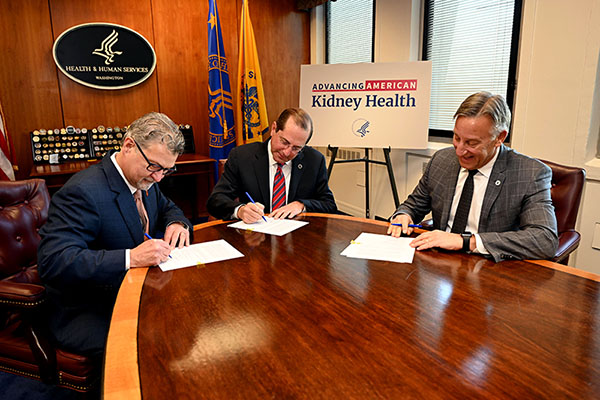Government Health systems, social systems, and environmental factors Prevention, daily life, and wellbeing Healthcare quality, access, and evaluation Disease prevention
December 17, 2019
As this year draws to a close, 2019 will mark a turning point in kidney health and 2020 will begin a new era for every patient with kidney disease in America. More federal funds will be focused on prevention, increasing the number of kidney transplants, and improving life for those on dialysis. The National Kidney Foundation is honored to have played a part.
Here is how we see the top 10 wins in 2019 that will advance kidney health:
- Sweeping executive order signs into policy NKF’s proposals: We were on the stage when one of the most significant initiatives came in July when the Advancing American Kidney Health Presidential order was signed into federal policy. With one stroke of the pen, many of our most important goals became the policy of this nation. We are just beginning to fully understand what this means at the patient level, but we could be more hopeful. The straight forward approach that is now federal policy aligns with much of our stated vision and mission, including ensuring better lives for patients on dialysis; increasing availability of transplantation; and eliminating all preventable kidney disease.
- Partnering with the big guys to raise awareness: Our relationship with the U.S. Department of Health and Human Services (HHS) developed in 2019 into a collaboration with HHS and American Society of Nephrology (ASN) on the Public Awareness Initiative for Advancing American Kidney Health campaign. We will spend 2020 unveiling components of this important campaign designed to reach the 33 percent of American adults at risk for developing kidney disease.
- Looking outside the box for life hacks: We partnered again with HHS on the KidneyX Patient Innovator Challenge, funded by NKF. It is a competition that invited everyday people to submit ideas and “life hacks” to improve the daily life for patients with kidney disease. The winners of these awards, which includes grant money to develop their ideas, will be announced at our 2020 Spring Clinical Meetings in New Orleans.
- Discovering the knowledge gaps: We also commissioned The Harris Poll to conduct a survey of American adults about diabetes and the risk of kidney disease for patients with Type 1 or Type 2. It turned out that too many Americans, 46 percent of those polled, don’t know that those with diabetes are at increased risk of kidney failure and we need to change that. Millions of Americans have diabetes, so it is imperative that we make sure they know that their kidneys are at risk of disease.
- National storyline about living donation: CBS television provided us with a unique opportunity to raise awareness about living donor kidney transplantation among their soap opera audience with the storyline in The Bold and The Beautiful daytime drama. The show’s writers worked with us on the script and a PSA aired after the episodes about living kidney donation and kidney disease.
- Pathways for Patients: We were thrilled to roll out a major educational series called “Kidney Pathways” that we hope will enable patients in all stages of kidney disease to better understand the disease and play a more active role in managing their care. Kidney Pathways is an online system that delivers a curriculum-based format offering need-to-know essentials that align with kidney disease risk factors and laboratory findings reported in the online health assessment.
- Crunching data for better outcomes: We released the findings of a landmark study conducted by the National Kidney Foundation and CareFirst BlueCross BlueShield (CareFirst) that found that detecting CKD with two simple tests and treating it based on severity can improve health outcomes for patients with diabetes and hypertension and lower the cost of caring for them. Conducted on more than 7,000 patients in CareFirst’s Patient-Centered Medical Home (PCMH) program from July 2015 to July 2017, the study helped PCPs save thousands of dollars per year per patient on certain healthcare costs, said Dr. Joseph Vassalotti, NKF’s Chief Medical Officer and a co-author of the study, titled CKD Quality Improvement Intervention with PCMH Integration: Health Plan Results.
- Advocates voices for change: This year, we again attended the annual Kidney Patient Summit and took 105 patient advocates with us to speak to lawmakers on Capitol Hill about kidney disease and the life patients who have it must lead. After our visit, nearly 100 Congressmen and women signed on as co-sponsors of the Living Donor Protection Act of 2019, which would protect people against various discrimination for donating an organ. We believe it will soon become federal law. HHS Secretary Alex M. Azar II made his first appearance at the summit and explained his vision to reform kidney care, health and treatment in America.
- Working to increase transplants: We continue to develop THE BIG ASK: THE BIG GIVE platform and in 2019, expanded to 15 new cities. We conduct in-person training that teaches patients and their care partners about living kidney donation and how to engage their communities in the search for a donor. This program is helping to increase the number of living donors, a critical component in raising the number of transplantations.
- Gathering the experts: We held our annual Spring Clinical Meetings this year in Boston. It was a record year in attendance, about 3,000 people in the world of nephrology came to the five-day event in May. Hundreds of studies and papers were presented, and the latest information shared at what is considered the biggest and most relevant gathering of those stakeholders in the care of kidney health in the U.S.
Why this all matters
Kidney disease is a worldwide health crisis. In the United States, an estimated 37 million people may have chronic kidney disease, but the majority don’t know they have the life-threatening illness.
What’s to come in FY20
We believe that all of these efforts in our fight against kidney disease are advancing kidney healthcare for all. The focused approach in 2019 resulted in strides we didn’t even imagine the year before.


















